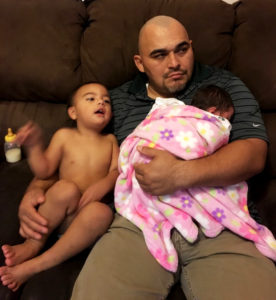
By Richard Pompa Jr.
The Accident
In April of 1987, at age 15, I was in an accident. While walking to a corner convenience store with two friends, a car struck me going about 60 mph. The impact sucked me into the windshield, head first and threw me 21 feet past the point of impact. I suffered from five skull fractures and both of my ear drums were blown.
They airlifted me to the hospital and at the time that I arrived, my brain began to swell, one of my lungs collapsed, and I was comatose. They gave me 48 hours to live.
In order to relieve the swelling on my brain, the doctors drilled a hole in my head and installed a shunt. Unfortunately, while drilling the hole, they also penetrated my brain, adding to the damage I sustained already. Later, they discovered a buildup of fluid in my brain, and they drilled a second hole on the upper right corner of my head to drain the fluid. The doctors penetrated my brain again.
After I was stabilized, I was transported to a children’s hospital. The doctor’s suspected that it would be at least two years before I could even hold a spoon.
After spending five weeks in a coma, I woke up at the end of May. Not only did I go through intense physical and occupational therapy, I had to relearn how to feed myself, read, write, talk, and use the facilities. I began to improve and progress at an astronomical rate, surpassing all the expectations of every doctor and specialist who had seen me.
Returning Home
I was discharged on June 8, 1987. Family and friends greeted me when I arrived home. During all the hustle and bustle, I remember telling my parents my head hurt. They believed that I was just overstimulated from all the commotion, but I had just had a seizure. Shortly after, I remember riding in the van with my parents and feeling as though the van was rocking back and forth. My parents believed that it was just a dizzy spell, but it was actually another seizure.
The first six weeks of school were rough and stressful. This is when I began to go through absent partial seizures on a regular basis. In class, 20 to 30 minutes would pass and I wasn’t able to account for that time. My parents convinced me I was just daydreaming and not paying attention.
The Wrong Diagnosis
When I was 16 years old, I experienced my first grand mal seizure at home. I woke up feeling drained, disoriented, and confused.
I continued to have frequent and continual absent partial seizure, but my parents believed I wasn’t paying attention. Finally, my parents took me to see a doctor.
My general practice doctor prescribed me Dilantin, but my seizures continued. The doctor questioned whether or not I was taking my medication as prescribed. The stress of working full-time and attending college was triggering my seizures.
A New Diagnosis
I got married at age 24, at which point I began working two jobs to help support my new family. My wife would wake me in the middle of the night and tell me that I had a seizure, but I ignored my frequent, nocturnal seizures as my parents had, and disregarded my wife’s pleas.
When my boss, a retired doctor, witnessed one of my grand mal seizures, things started to change. After returning from the emergency room, my boss recommended that I see a specialist. He told me I wasn’t to return to work until I saw a neurologist or epileptologist.
My wife thankfully scheduled an appointment for me to see a neurologist. After explaining my entire story to the neurologist, the doctor told me I have epilepsy, starting when I was 15 years old. She told me that my recovery was miraculous and I needed to stop denying and minimizing what were clearly seizures. I was placed on disability for three months and underwent sleep deprivation tests, seizure studies, and countless other tests.
When I saw my neurologist to discuss the findings of these tests, she confirmed that I have epilepsy. Additionally, I suffered from a Traumatic Brain Injury (TBI) and my condition was worsening.
A Helping Hand
I couldn’t recover medical records from my stays at the hospital. I tried to apply for disability with the records I did have, and was denied four times. The Social Security Administration stated that I could work, as evidenced by my previous work history and education. When I felt as if I had lost all hope, my wife suggested I contact the Epilepsy Foundation Central & South Texas. The Epilepsy Foundation Central & South Texas offered me help in a way no one else had – they were entirely focused on getting me what I needed.
The Epilepsy Foundation referred me to receive free legal aid. Now, with a lawyer, I was able to recover all my previous medical records. After reviewing my discharge papers, I saw the doctor had recommended that I be placed on disability immediately. My parents had not told me this.

Clarity and Acceptance
I was very close to losing my faith. I questioned everything: why would God let me live like this? When I thought there was no faith left in me, I came across a passage that helped me gain perspective: “also we have obtained an inheritance, having been predestined according to His purpose who works all things after the counsel of His will” Ephesians 1:11.
Ten years have passed since I received my clarity and peace. To this day, I still cling on to that scripture for comfort and support. God has willed me to go through this, but also he helped me get my degrees and has given 23 years of marriage, three beautiful daughters, two grandsons, and two granddaughters.
Thank you to Richard Pompa Jr. for sharing his epilepsy story. To share your story, contact us at Staff@EFCST.org or (210) 653-5353.




Comments are closed.